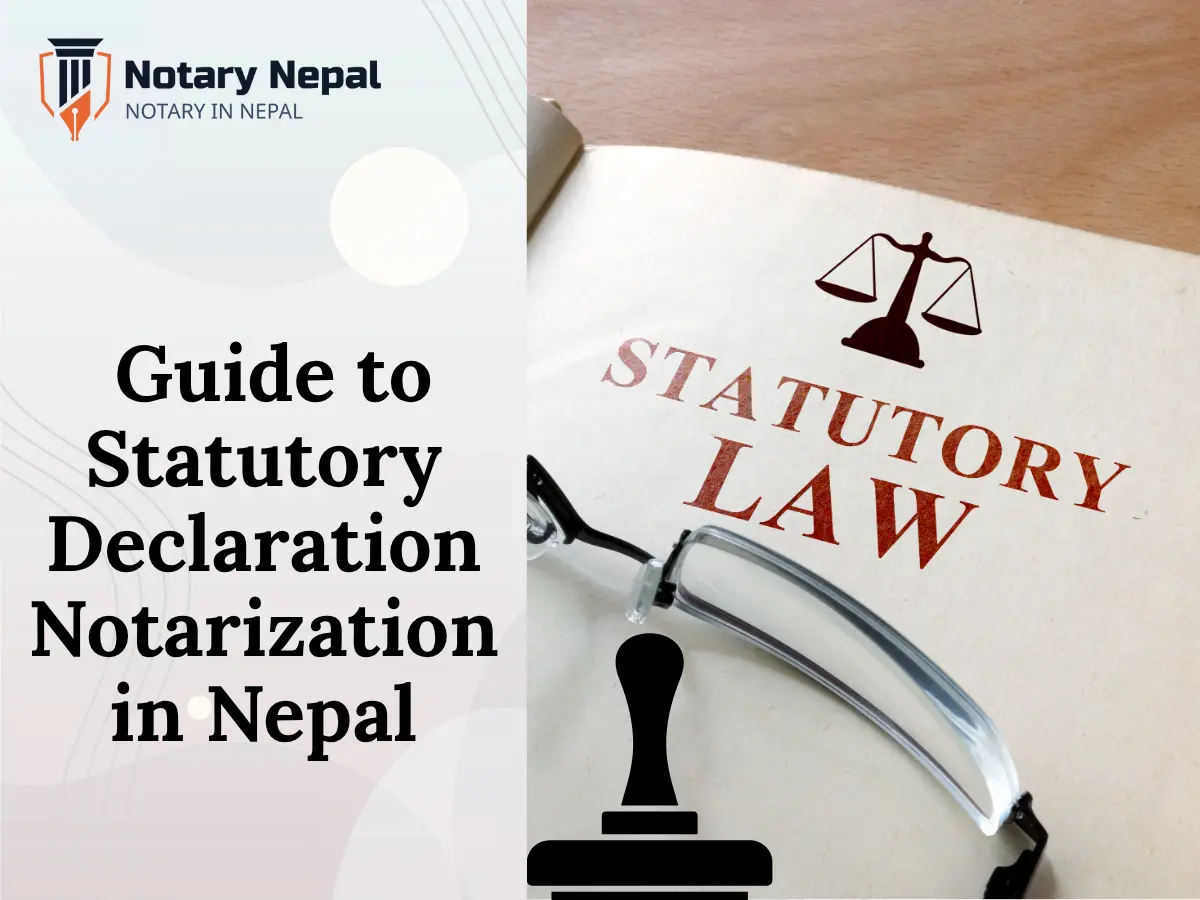

Table of Contents
In Nepal, statutory declarations are a crucial legal tool used across various sectors—from courts to businesses, education, and healthcare. Understanding what statutory declarations are, their legal significance, and how to correctly prepare and notarize them is essential for individuals and organizations alike. This guide covers everything you need to know about statutory declaration notarization in Nepal, including step-by-step instructions, legal requirements, common mistakes, and expert tips for seamless processing.
What is a Statutory Declaration?
A statutory declaration is a legally binding statement of fact, affirmed in writing and sworn before an authorized official such as a notary public or magistrate. Unlike affidavits, which are sworn under oath, statutory declarations confirm that the information provided is true to the declarant’s knowledge. In Nepal, they are widely used for legal filings, business contracts, immigration procedures, and academic certifications.
History and Legal Context of Statutory Declarations in Nepal
Statutory declarations originated from British legal traditions and were adapted into Nepal’s legal system to formalize declarations outside courtrooms. While not as commonly discussed as affidavits, statutory declarations have become increasingly important as Nepal’s administrative and legal frameworks modernize. They serve as a trusted method to provide verified statements for various government and private processes.
Differences Between Statutory Declarations and Affidavits
While both are sworn statements, affidavits are made under oath and carry penalties for perjury, whereas statutory declarations rely on solemn affirmation without an oath. Statutory declarations tend to be used for less formal matters but still carry legal weight in Nepal, especially when notarized and submitted correctly.
How to Prepare a Statutory Declaration in Nepal
Step 1: Understand the Purpose
Clearly identify the reason for your statutory declaration, whether for legal, business, immigration, or personal use.
Step 2: Use the Correct Format
Follow a legally accepted format which includes your full name, statement of facts, declaration of truthfulness, and signature.
Step 3: Gather Supporting Documents
Attach any documents that support your declaration to strengthen its validity.
Step 4: Visit a Notary Public
Statutory declarations must be notarized by a licensed notary in Nepal to be legally recognized.
Step 5: Submit the Document
Once notarized, submit your statutory declaration to the relevant authority such as courts, government offices, or educational institutions.
Key Legal Requirements and Notarization Process
- The declarant must be present in front of the notary.
- The notary verifies identity and witnesses the signing.
- Documents are stamped and signed to confirm notarization.
- Certified copies of statutory declarations may also be requested.
- In Nepal, full digital notarization is not available; the process is hybrid, involving physical printing, notarization, and delivery either digitally or via courier.
Common Mistakes to Avoid in Statutory Declarations
- Incorrect or incomplete format.
- Lack of notarization or improper verification.
- Ambiguous or vague statements.
- Missing supporting evidence or attachments.
- Not using the correct terminology.
- Failing to renew or update declarations as required.
Use Cases of Statutory Declarations in Nepal
- Legal Proceedings: Court affidavits, evidence submission, property disputes.
- Business Transactions: Contract validations, partnership agreements, financial disclosures.
- Immigration and Visa: Affirming personal status, residency claims, document authenticity.
- Academic Certifications: Verification of transcripts, degrees, and qualifications.
- Healthcare: Declaration of medical histories, insurance claims.
- Personal Matters: Name changes, guardianship, and inheritance claims.
Online and Hybrid Notarization Services in Nepal
Nepal currently offers a hybrid notarization process for statutory declarations. Documents can be sent via email or messaging apps like WhatsApp to service providers, who then print, notarize, and return the documents either digitally (scanned copies) or via courier. Clients may also pick up hard copies in person. This system balances convenience and legal authenticity, despite the absence of full digital notarization.
How to Choose the Right Notary Service for Statutory Declarations
- Verify credentials and licenses.
- Check experience with statutory declarations.
- Confirm confidentiality and security measures.
- Assess turnaround times and flexibility.
- Ensure clear pricing and no hidden fees.
- Look for positive reviews and client testimonials.
- Prefer services offering hybrid notarization options.
Frequently Asked Questions (FAQs)
Q: Are statutory declarations legally binding in Nepal?
A: Yes, once properly notarized, they hold legal value in courts and administrative procedures.
Q: Can I notarize a statutory declaration online?
A: Nepal offers hybrid notarization; documents can be submitted online but notarization requires physical handling.
Q: What documents are needed for notarization?
A: Valid photo ID, the declaration document, and any supporting evidence are necessary.
Q: How long does notarization take?
A: Typically 24-72 hours depending on service provider and delivery method.
Q: Can I use a statutory declaration abroad?
A: Yes, often with additional legalization like apostille or embassy verification.
Summary
Statutory declarations are vital documents in Nepal’s legal and administrative processes. Understanding the preparation, notarization, and submission requirements ensures your declarations are accepted and effective. While full digital notarization is pending, Nepal’s hybrid system offers efficient and legally sound options for all users. Engage with professional and trusted notary services to safeguard your documents’ authenticity and compliance.
Contact Notary Nepal for Statutory Declaration Notarization Services
For expert statutory declaration notarization in Nepal, trust Notary Nepal — your partner for accurate, timely, and confidential services.
+977 9765979296
www.notarynepal.com
This article is for informational purposes only and does not constitute legal advice, advertisement, or solicitation. Notary Nepal and its team are not liable for any consequences arising from reliance on this information. For legal advice, please contact us directly.


